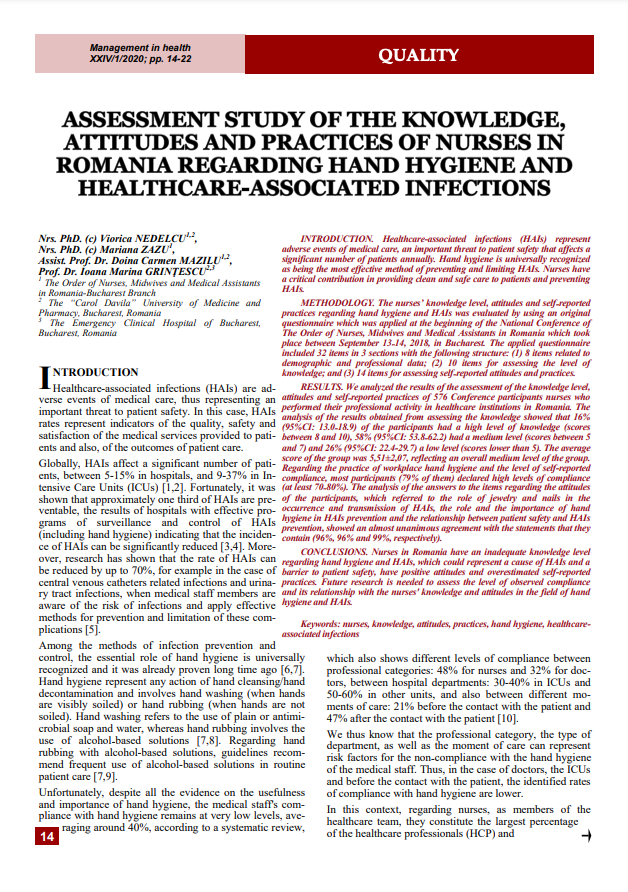Abstract
INTRODUCTION. Healthcare-associated infections (HAIs) represent adverse events of medical care, an important threat to patient safety that affects a significant number of patients annually. Hand hygiene is universally recognized as being the most effective method of preventing and limiting HAIs. Nurses have a critical contribution in providing clean and safe care to patients and preventing HAIs.
METHODOLOGY. The nurses’ knowledge level, attitudes and self-reported practices regarding hand hygiene and HAIs was evaluated by using an original questionnaire which was applied at the beginning of the National Conference of The Order of Nurses, Midwives and Medical Assistants in Romania which took place between September 13-14, 2018, in Bucharest. The applied questionnaire included 32 items in 3 sections with the following structure: (1) 8 items related to demographic and professional data; (2) 10 items for assessing the level of knowledge; and (3) 14 items for assessing self-reported attitudes and practices.
RESULTS. We analyzed the results of the assessment of the knowledge level, attitudes and self-reported practices of 576 Conference participants nurses who performed their professional activity in healthcare institutions in Romania. The analysis of the results obtained from assessing the knowledge showed that 16% (95%CI: 13.0-18.9) of the participants had a high level of knowledge (scores between 8 and 10), 58% (95%CI: 53.8-62.2) had a medium level (scores between 5 and 7) and 26% (95%CI: 22.4-29.7) a low level (scores lower than 5). The average score of the group was 5,51±2,07, reflecting an overall medium level of the group. Regarding the practice of workplace hand hygiene and the level of self-reported compliance, most participants (79% of them) declared high levels of compliance (at least 70-80%). The analysis of the answers to the items regarding the attitudes of the participants, which referred to the role of jewelry and nails in the occurrence and transmission of HAIs, the role and the importance of hand hygiene in HAIs prevention and the relationship between patient safety and HAIs prevention, showed an almost unanimous agreement with the statements that they contain (96%, 96% and 99%, respectively).
CONCLUSIONS. Nurses in Romania have an inadequate knowledge level regarding hand hygiene and HAIs, which could represent a cause of HAIs and a barrier to patient safety, have positive attitudes and overestimated self-reported practices. Future research is needed to assess the level of observed compliance and its relationship with the nurses' knowledge and attitudes in the field of hand hygiene and HAIs.

